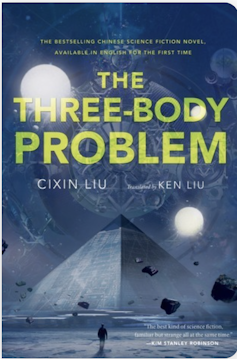Liu Cixin’s extraterrestrial novel is a heady blend of politics, ethics, physics and Chinese history
- Written by Josh Stenberg, Associate Professor in Chinese Studies, University of Sydney

Liu Cixin’s The Three-Body Problem – the first of a popular trilogy titled Remembrance of Earth’s Past – has entertained and challenged readers since first appearing in Chinese in 2006.
The 2014 English translation, by acclaimed American science-fiction author Ken Liu, became the first work by an Asian author to win the Hugo Award for best sci-fi novel[1].
The book is among the most widely-read works of modern Chinese fiction in English[2], and Liu’s critical reputation and fan base (which includes Barack Obama and Mark Zuckerberg[3]) continues to grow. A 30-episode Chinese adaptation[4] of the The Three-Body Problem aired in 2023; Netflix will release a condensed, eight-episode version later in March[5].

















